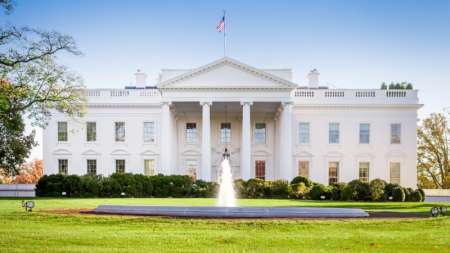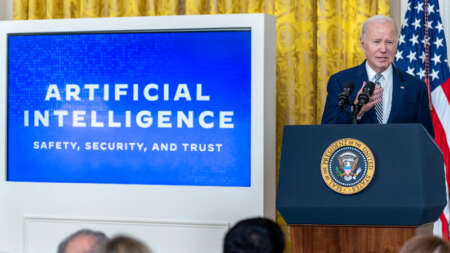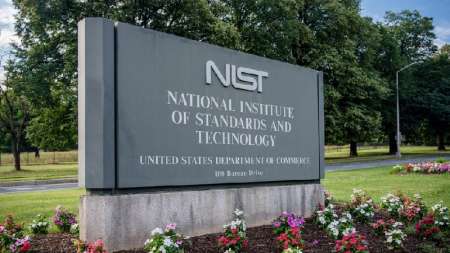As agencies enter 2026, executives from some of the federal government’s top IT and service vendors predict that federal technology success will hinge less on adopting new tools and more on operational foundations. […]
The General Services Administration (GSA) today unveiled its USAi platform, created to offer government agencies the ability to experiment with artificial intelligence technologies and inform their decisions to put the tech to work. […]
The Department of the Air Force (DAF) has undergone significant changes recently to automate its procurement processes and address risk management issues, a DAF official shared on Wednesday. […]
Vinay Singh, who is fresh off a two-year stint as the CFO and chief artificial intelligence officer (CAIO) at the U.S. Department of Housing and Urban Development (HUD), said the agency needs to stay focused on literacy and innovation in its development of AI technologies to benefit operations and mission delivery. […]
The White House late Thursday issued an executive order from President Donald Trump that aims for his administration to develop a Federal government “action plan” on artificial intelligence technologies within the next six months. […]
Senior officials from two Federal agencies said this week that they are increasingly using artificial intelligence (AI) technologies to automate routine tasks, boost efficiency, and improve cybersecurity. […]
As artificial intelligence (AI) becomes more integrated into intelligence operations, U.S. agency officials face a challenging balancing act. While AI promises improvements in data analysis and automation, use of the technology also poses significant concerns about privacy, civil liberties, and potential misuse by adversaries. […]
Four months have passed since the Biden-Harris administration unveiled its AI executive order (EO), tasking more than 50 Federal entities to take more than 100 specific actions to implement guidance covering eight broad areas of policy. […]
Top Federal officials said this week that President Biden’s recent artificial intelligence (AI) executive order (EO) will prove to be most significant in the role that it will play in recruiting talent to the Federal government. […]
On October 30, 2023, President Joe Biden stood in the East Room of the White House and unveiled an executive order (EO) on artificial intelligence (AI) that was breathtaking in scope. “AI is all around us,” the president said as he signed the 111-page document. In the near term, there is plenty that Federal agencies can do to work toward achieving the goals of the EO. […]
Federal agencies have been meeting “key” deadlines from President Biden’s artificial intelligence (AI) executive order (EO) and are even ahead of schedule on a handful of tasks, according to a three-month progress report the White House released today. […]
The Department of Commerce’s National Institute of Standards and Technology (NIST) is looking for feedback on the responsibilities that it’s undertaking as part of President Biden’s recent artificial intelligence (AI) executive order (EO). […]
Many Federal agencies are looking to use AI as a key cybersecurity tool, but before agencies get too far ahead of themselves, U.S. Air Force Deputy Chief Information Officer (DCIO) Winston Beauchamp said on Tuesday that the number one thing agencies can do to improve their cybersecurity posture is to modernize their IT architecture. […]
The Department of Energy (DoE) has announced $16 million in funding for 15 different projects that will use artificial intelligence (AI) and machine learning (ML) technologies to further research in nuclear physics. […]
Witnesses at a House Oversight and Accountability subcommittee hearing on March 8 urged lawmakers to be proactive about artificial intelligence (AI) technologies and establish guidelines and protections so that AI-based systems are developed and deployed responsibly. […]
Artificial intelligence (AI) technologies holds great promise to improve the lives of millions of Americans yet also pose risks that include biased application and potential misuse by foreign adversaries, Senate Homeland Security and Governmental Affairs Committee Chairman Gary Peters, D-Mich., said on March 8. […]
The Biden Administration’s Blueprint for an AI Bill of Rights has been public for two months, and artificial intelligence experts want to see more Federal agencies leveraging the guide to help protect the rights of Americans in an AI-powered world. […]
Along with the 32 national teams from around the globe gathering for the World Cup in Qatar, artificial intelligence (AI) technologies are making a strong showing as the latest entrant in the tournament that might just help even the playing field by making boosting the fairness of on-field play. […]
The future of artificial intelligence (AI) technologies in government remains a developing work in progress, but for evidence of the technology’s rapid development and staying power, it might just be enough to order some fast-food takeout. […]
As intense wildfires have become a more serious issue in the last few years worldwide – causing billions of dollars in damage in the western U.S. alone – firefighting teams need a better solution to mitigate and better understand the cause of the spreading conflagrations. […]
In today’s digital age, it’s clear that artificial intelligence (AI) and machine learning (ML) will be a part of all digital transformation journeys – including those of government. […]
The Federal government is cultivating artificial intelligence (AI) technology gardens across major agencies, but varying mission requirements and funding streams for those efforts are producing strikingly uneven results. […]
The Department of Energy (DoE) could improve how it manages its fraud, waste, and abuse practices by improving access to the data used by the agency and its contractors for data analysis, as well as using all tools available to keep the department’s research secure, according to a Nov. 26 DoE Office of the Inspector General (OIG) report. […]
Intelligent automation is quickly changing the landscape of healthcare, medical research, and health services by enabling the automatic classification, extraction, and enrichment of information. This is helping agencies provide a better experience for patients, cutting back on costs, and reducing turnaround time, according to Federal health experts at a FedInsider virtual event Oct. 28. […]
The September 29 kick-off meeting of the Trade and Technology Council (TTC) created earlier this year by the United States, European Commission, and European Council produced initial commitments by the three parties to coordinate on technology issues including the development of artificial intelligence (AI) technologies, and semiconductor supply chains. […]
The impact of Artificial Intelligence (AI) on the world will extend far beyond narrow national security applications. Federal officials spoke about moving beyond those narrow AI applications to gain strategic advantage and the importance of justified trust when deploying AI systems on September 27, during a webinar hosted by the Software Engineering Institute at Carnegie Mellon University. […]
To ensure the future of U.S. air dominance and maintain a competitive advantage against adversaries, the U.S Air Force wants to use cognitive electronic warfare, artificial intelligence, and work through advanced systems integration. […]
The role of artificial intelligence (AI) in managing records in the government continues to grow in importance, and it will continue to play a critical role in the future, Federal agents said during a virtual conference hosted by the Digital Government Institute on September 2. […]
The Department of Homeland Security (DHS) Science and Technology Directorate (S&T) released an artificial intelligence (AI) and machine learning (ML) strategic plan that will look to outline the DHS approach to using these emerging technologies. […]
Federal IT leaders want to see their agencies achieve enterprise-wide artificial intelligence (AI) proficiency in the next three to four years, according to a recent survey from MeriTalk underwritten by Dell Technologies and NVIDIA, “From Pilots to Proficiency: Operationalizing Federal AI.” […]





















